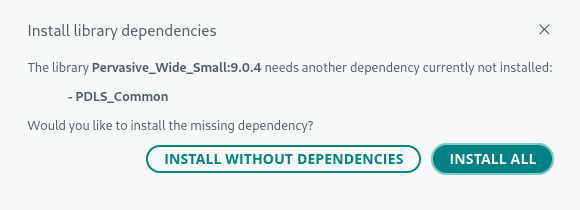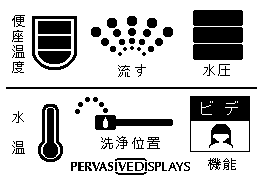Driver installation¶
The driver library manages the panel and the board: it sends the image from the frame-buffer to the screen and refreshes the panel.
Warning
Ensure the hardware and software configuration meets the requirements listed at the Used environment page.
Install the drivers¶
Different procedures are available to install the drivers: using the Arduino IDE, using Arduino CLI, or downloading from the GitHub repository.
This section is required only if the drivers haven’t been installed as dependencies of the PDLS_Basic library.
-
Launch the Arduino IDE;
-
Call the menu Sketch > Include library > Manage libraries…;
-
Search for
Driver_EPD; -
Select the
Pervasive_Wide_Smalllibrary for monochrome screens with wide temperature and embedded fast update, small size; - Select the
Pervasive_Wide_Mediumlibrary for monochrome screens with wide temperature and embedded fast update, medium size; - Select the
Pervasive_Wide_Largelibrary for monochrome screens with wide temperature and embedded fast update, large size; - Select the
Pervasive_BWRY_Smalllibrary for colour black-white-red-yellow screens, small size; - Select the
Pervasive_BWRY_Mediumlibrary for colour black-white-red-yellow screens, medium size; - Select the
Pervasive_BWRY_Largelibrary for colour black-white-red-yellow screens, large size; -
Select the
Pervasive_Touch_Smalllibrary for touch monochrome screens, small size; -
Click on Install to install it.
The IDE prompts to install the dependencies.

- Click on Install all. This is the recommended procedure.
The Arduino IDE downloads and installs the library and all its dependencies, including PDLS_Common and the drivers.
- Proceed directly to the next step, Check.
Otherwise, for Install without dependencies,
-
Select and install
PDLS_Common; -
Proceed to install the required drivers.
-
Open a terminal window;
-
Launch for the
Pervasive_Wide_Smalldriver:
arduino-cli lib install Pervasive_Wide_Small
Downloading Pervasive_Wide_Small@9.0.2...
Downloaded Pervasive_Wide_Small@9.0.2
Installing Pervasive_Wide_Small@9.0.2...
Installed Pervasive_Wide_Small@9.0.2
Downloading PDLS_Common@9.0.2...
Downloaded PDLS_Common@9.0.2
Installing PDLS_Common@9.0.2...
Installed PDLS_Common@9.0.2
- Perform the same procedure for the other drivers.
| Driver | Content |
|---|---|
Pervasive_Wide_Small |
Monochrome screens with wide temperature and embedded fast update, small size |
Pervasive_Wide_Medium |
Monochrome screens with wide temperature and embedded fast update, medium size |
Pervasive_Wide_Large |
Monochrome screens with wide temperature and embedded fast update, large size |
Pervasive_BWRY_Small |
Colour black-white-red-yellow screens, small size |
Pervasive_BWRY_Medium |
Colour black-white-red-yellow screens, medium size |
Pervasive_BWRY_Large |
Colour black-white-red-yellow screens, large size |
Pervasive_Touch_Small |
Touch monochrome screens, small size |
- Download
Pervasive_Wide_Smallfrom Pervasive_Wide_Small repository for the monochrome screens with wide temperature and embedded fast update, small size; - Download
Pervasive_Wide_Mediumfrom Pervasive_Wide_Medium repository for the monochrome screens with wide temperature and embedded fast update, medium size; - Download
Pervasive_Wide_Largefrom Pervasive_Wide_Large repository for the monochrome screens with wide temperature and embedded fast update, large size; - Download
Pervasive_BWRY_Smallfrom Pervasive_BWRY_Small repository for the colour black-white-red-yellow screens, small size; - Download
Pervasive_BWRY_Mediumfrom Pervasive_BWRY_Medium repository for the colour black-white-red-yellow screens, small size; - Download
Pervasive_BWRY_Largefrom Pervasive_BWRY_Large repository for the colour black-white-red-yellow screens, small size; - Download
Pervasive_Touch_Smallfrom Pervasive_Touch_Small repository for the touch monochrome screens, small size. -
Download
PDLS_Commonfrom Pervasive_Touch_Small repository for the utilities. -
Install the packages following the procedure Installing additional Arduino libraries .
Check¶
Example
The example below targets the screen 271-KS-09 and the board Raspberry Pi Pico (RP2040).
-
Launch the Arduino IDE.
-
Call the menu Tools > Boards… to select a board.
-
Call the menu File > Examples > Pervasive_Wide_Small > Demo_New.
-
Ensure the driver library is included.
#include "Pervasive_Wide_Small.h"
- Edit the lines and set the correct screen and board.
Pervasive_Wide_Small myDriver(eScreen_EPD_271_KS_09, boardRaspberryPiPico_RP2040);
- Click on Verify or Build.
The screen should display

See also¶
-
Select one of the boards;
-
Set the configuration of the screen;
-
Use the different graphics and text functions;
-
Refer to the reference manual for an exhaustive list of the functions with details of the parameters and returned values.